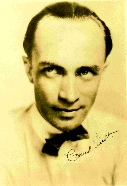
The Conrad Veidt Society
The Plot:
PRODUCTION HISTORY
This film was produced in America, in 1940, while the United States was technically still neutral..
MY REVIEW
A cerebral prison camp 'escape movie'. You'd never see it's like today.
NOTES OF INTEREST
Books that mention this Movie: Gavin Lambert's book ''On Cukor'' isn't a standard bio; it's a series of interviews with Cukor about his films and his career in general. On Escape, all Cukor says about it is that it was a project he wanted to do, but it was taken away from him. In his bio of Norma Shearer, Lambert says Shearer agreed to do Escape when Louis B. Mayer appealed to her ''sense of public duty,'' since it was a film about the evils of Nazism, and Mayer was more interested in exploiting and exposing that than continuing to appeal to the German market (remember, the U.S. wasn't at war with Germany yet). Her part was expanded to include a romance with the character played by Robert Taylor. Cukor was let go from the project by producer Lawrence Weingarten, who then offered it to Hitchcock, who turned it down, and then gave it to Mervyn LeRoy. Nothing on how much, if any, Shearer consulted with Cukor on the film. There's very little on CV, but here is the paragraph:
''After a week's shooting, [director Mervyn] LeRoy found Paul Lukas [as General von
Kolb] lacking in menace and replaced him with Conrad Veidt. It was his most positive
contribution as a director. Norma and Veidt struck an immediate rapport, and in their
scenes together Escape comes alive, in spite of an artificial studio-
Also from Lambert's Shearer bio: Director Sidney Franklin was having trouble coming up with an actor to play the impotent Louis XVI of France for Shearer's film Marie Antoinette. He first wanted Charles Laughton (unavailable), then Spencer Tracy (Shearer and producer Stromberg were opposed). The next suggestion was Charles Boyer, but he turned down the part. So then, Lambert says, ''producer and director then rounded up some remarkably dissimilar actors to make tests, including Cedric Hardwicke, Ralph Richardson, Conrad Veidt, Maurice Evans, Roger Livesey and Emlyn Williams.'' None of them ''clicked'' so then he tested Peter Lorre. Robert Morley ended up with the part.
I've Seen That Face Somewhere Before
Albert Bassermann and his wife Elsa play Dr. Arthur Henning and his wife. A poignant bit of casting, considering that the Bassermann's fled Nazi Germany. (Elsa Bassermann was Jewish).
Bonita Granville, who plays Ursula, is most famous for her series of Nancy Drew movies.
PHOTOS
BOOKS
Books available from Amazon.com
Order the book by Ethel Vance on which the movie was based. ESCAPE here.
If you are interested in other books about cinema history, or other videos, check out what's available from Amazon.com. Type in a title or a subject below. Please note that all commissions earned from the sales generated by people following this link go to the 'To Connie, With Love' Fund.
By Barbara Peterson
Escape
THE PLAYERS
Conrad Veidt
Norma Shearer
Robert Taylor
Alla Nazimova
FelixBressart
Albert Bassermann
Philip Dorn
Bonita Granville
Edgar aBrrier
Elsa Bassermann
Blanche Yurka
Lisa Gohn
General Kurt von Kalb
Countess von Treck
Mark Preysing
Emmy Ritter
Fritz Keller
Dr. Arthur Henning
Dr. Ditten
Ursula
Commissioner
Mrs. Henning
Nurse
Anna
